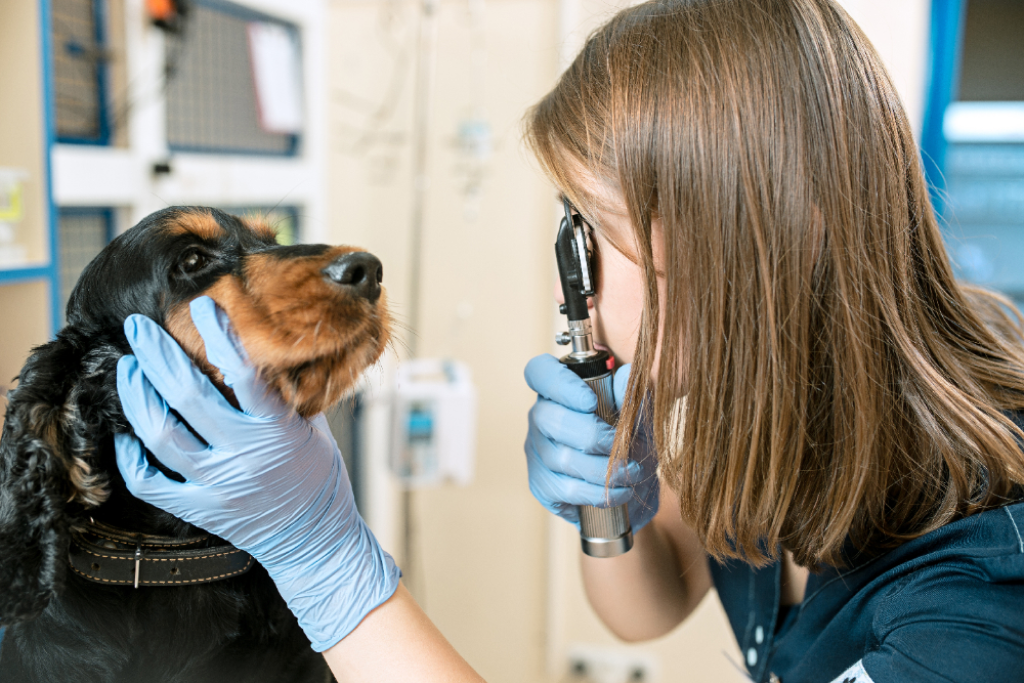Optic neuritis is an ocular condition where the optic nerve becomes inflamed, causing damage to the nerve. Left untreated, optic neuritis can be painful and can lead to vision loss, which in some cases may be permanent. Our guide to optic neuritis will take you through the causes, symptoms, and diagnosis for optic neuritis, as well as outlining treatment options with Knutsford Vets Surgery.
What is optic neuritis?
Optic neuritis is inflammation of the optic nerve, the structure responsible for transmitting electrical signals from the retina to the brain. If left untreated, it can be painful, and may result in some degree of vision loss. Often, the condition is caused by an underlying disease or deficiency, but can also be a result of infection and trauma.
Optic neuritis causes
Optic neuritis in dogs is usually a manifestation of granulomatous meningoencephalitis. This is an immune-mediated disorder of the central nervous system (CNS) that most commonly affects small to mid-sized dogs. Other causes of optic neuritis include:
- Infection
- Infectious peritonitis (FIP) in cats
- Trauma
- Inflammatory disease of the surrounding tissue
- Toxins
- Vitamin A deficiency
- Cancer
Optic neuritis symptoms
Some symptoms of optic neuritis will depend on the cause of the condition, but in most cases the pupil will be dilated and the optic nerve head should appear swollen and/or dull. Other symptoms of optic neuritis include:
Sudden loss of vision & decreased depth perception
Most pets will have some loss of vision in the affected eye, but the extent varies. Similarly, pets with optic neuritis may experience decreased depth perception or peripheral vision loss. The affected vision may be temporary with early intervention, but can be permanent in some cases.
Pain and tenderness
Many pets will experience discomfort as a result of optic neuritis that is worsened by eye movement. Further to this, the inflammation of the optic nerve will likely also cause pain or tenderness around the eye area.
If you notice any of these symptoms in your pet, it’s important to book an appointment with your vet as soon as possible.
Diagnosis of optic neuritis
Diagnosis of optic neuritis isn’t always simple, and may require the expertise of an Ophthalmologist. This will usually involve various eye tests to check pupil movement and vision in high and low light levels. ERG, MRI and CT scans are additional tests that are often required to diagnose optic neuritis. General anaesthetic or sedation may be required for these tests as your pet must remain still to gain an accurate picture.
Treatment for optic neuritis
Optic neuritis treatment commonly involves anti-inflammatory or immunosuppressive drugs. This will help to reduce the swelling around the optic nerve. In some cases, antibiotics and topical treatments may also be prescribed.
If the condition was caused by underlying health concerns, further treatment may be required to address those concerns.
Recovery from optic neuritis
Recovery and return of vision will depend on the severity of the condition and any underlying causes. In severe cases where the optic nerve has been damaged, vision loss is likely to be permanent as the nerve cannot repair itself, however in uncomplicated cases where the condition was caught early, restoration of vision is possible with early intervention.
Knutsford Vets Surgery
By choosing Knutsford Vets Surgery, your pet will be in the safe hands of experienced Ophthalmologist, Dr Paul Adams. Dr Adams has years of experience treating a wide range of eye conditions, and is the perfect partner to look after your pet’s ocular health.
We welcome new patients, second opinions and referrals.
Our friendly team is on hand if you have any questions. Contact us on 01565 337999.





